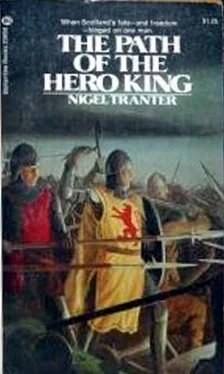Expressionless the King turned to Boyd, Hay and the lady, as they came up.
Cousin-let me carry you across, he said levelly.
The rest, follow exactly where I tread. A foot wrong, and you will be swept away. Lead each horse with great care. It is like a causeway, smooth rock, and slippery. And it is not straight. That sounded almost like a childs learned lesson repeated.
He picked up the woman in his arms, and now she found nothing to say to him, in the face of that granite-like sternness of expression.
He stepped into the swirling water with her, and waded across with steady deliberate pacing, counting the steps until making a dogs-leg bend two-thirds of the way over. Setting his burden down, wordless, at the far bank, he paused, to watch the progress of the others. Gilbert Hay, eyeing him, thought that he had never seen a face so abruptly and direly changed. It was as though the living flesh had been overlaid and cast in hard, unyielding bronze, the lively eyes hooded and dull-glazed. No man sought to catch those eyes.
When all were across the hazard of the torrent, Bruce led on slantwise uphill, away from the water, to skirt the foot of the crags, amongst the rock-falls and screes. For perhaps a quarter-mile more they climbed, until they came to a single Highland sentinel beside a great boulder. Beyond was a sort of re-entrant in the cliffs, with a scooped dip before it and at the foot, the yawning mouth of a cave.
There was no room here for the horses, and Hay took them, and the men-at-arms, down to a hidden green hollow near by, amongst gorse-bushes and scattered hawthorns, where the few beasts left from Tumberry were hobbled. Bruce ushered his principal guests into the cave. Behind the lady, he paused, turning to Boyd.
Cages, you said? In the open air? On walls? In winter? For a child! And women! He spoke as though he used a foreign language, carefully, without intonation.
I did not mishear?
Cages, Sire. High on the outer walls of London Tower, Roxburgh and Berwick Castles. Boyd raised his eyes to his monarchs face, and quickly dropped them again.
They went inside.
Later, with Boyd and two men sent to escort his cousin through the
night-bound hills back to her small property of Newton, south of
Maybole, Bruce crouched at the back of the cave, where it bent and lowered to form almost a separate little chamber, hidden from the rest. A log as seat, he sat hunched, staring with unseeing eyes at the spluttering, smoking makeshift lamp, contrived from melted fat and a wick of cord in, strangely, a handsome silver quaich or drinking-vessel, one of the spoils of Turabeny though with the Bruce arms engraved thereon.
Alone he had sat there, for how long he knew not, facing the beetling dark walls and the hell of his own lot. He had been low before, all but crushed by the hammer-blows of fate, of treachery, of Edward Plantagenet. But he had never been so low as this.
Before his tortured minds eye had passed the long appalling procession of his friends and kin and supporters, those whom he or his cause had brought to ruin, shame, agony and death. Wallace, barbarously butchered. Andrew Moray, slain. The Graham, slain.
Gartnait of Mar, his brother-in-law, assassinated. Simon Fraser, tortured and hanged-like his brother Alexander, like Hays brother Hugh. Somerville of Camwath, Barclay of Cairns, David de Inchmartin, Scrymgeour the Standard-Bearer dying the death of Wallace. William Lamberton, his closest friend and ally, chained a prisoner. As was old Bishop Wishart of Glasgow. Nigel, laughing, lively Nigel, hanged, drawn and quartered. And now Alex and Tom hideously executed also. Christopher Seton the same. His Elizabeth in solitary confinement. His little daughter like a caged beast for all to mock at. One sister and Isabel of Buchan likewise. Another, gay, lightsome Christian, walled in a convent.
Randolph, his nephew, in prison. Others, countless others, suffering or past suffering. Because he had presumed to defy the usurper and put on the fatal crown. Or because he had stabbed John Comyn at Gods own altar… He had been King a year. And what of his kingdom did he hold?
This cave, in his own lost earldom of Carrick. His strength? One remaining brother, the least loved, and a small handful of knightly friends. Less than 400 men. Nearly all wild Highlandmen, with him not for him or his cause but for love of their chieftainess. His lieges, the folk of his realm? They turned from him, stayed at home-as who would blame them! The invader was everywhere supreme, buttressed by unlimited power and numbers, sustained by traitors, egged on to consistent atrocity by the burning hatred of their lord, Edward. Edward, who would never relent, never for a moment relax the pressure.
Edward the scourge of God on Scotland and on Robert Bruce.
There it was, the scourge of God! God had raised His hand against the presumptuous man who, a murderer, had dared to claim the holy anointing. Robert Bruce, the Lords Anointed!
Heaven help Scotland, with such for monarch! A King whom Holy Church had put forth, as anathema. To whom no priest dare offer the sacraments. The Bruce, outcast of God and man. Today a hunted, haunted fugitive. Tomorrow …?
Tomorrow-what betterment could be looked for tomorrow, in the name of truth? None. No least likelihood of improvement. The reverse, indeed. For after Turnberry, every English nerve and sinew would strain to punish and revenge, Edwards fury beyond all bounds. If forty men was all the response of Scotland to the night of Turnberry and her Kings return-and these the gift of a kinswoman who had ever foolishly doted upon him-what hope of the future? A fool, he had said that she gave him hope and faith.
Boyd and she, then, had taken such back with them again. For there was no hope, no faintest gleam of hope, in all the grim scene, in fact. And faith was not for such as Robert Bruce.
What, then? What remained for him? He was not yet old-though he felt ages old. He was but thirty-three. He was unlikely to die yet awhile, save by violence. He could seek that violent end, and find it no doubt, with little difficulty, many aiding. But would that not almost certainly involve the end of these last few who still trusted in him, his handful of leal friends?
Douglas, Hay, Campbell, Boyd. And Edward, his headstrong brother?
Would he have their blood also on his soul? Not that..
Lead them back to Arran, then? Secretly. Thence to the Isles, where they could sell their swords to Angus Og for his Irish wars. A sad descent for such as these-but it would save them from the Plantagenet. He himself go on, alone, and lose himself in the greater world, beyond. Put all behind him, and go. Go where? Was there anywhere for him in all that world? Would he not be better to end it all, quietly, in the empty sea? The king without a kingdom, the earl without an earldom, the knight without honour, the friend whose friendship spelt death.
The knight without honour? He had vowed those vows of knighthood once madness that it was Edward Plantagenet himself who had conferred that knighthood, heard those vows!
Edward! Those vows he had taken before another altar. Amongst them, to take up his sword in the cause of the true faith, against the Infidel. Not to rest while the savage Unbeliever occupied Christs holy places. His father and grandfather before him had both fulfilled that knightly vow-Edward, even-and gone on a Crusade.
Was that at least not left to him? Was that not a better way to die?
A single, simple knight again, to throw himself against the Saracen,
and so make an end. Might there not just possibly, conceivably, be some small, faint glimmer of credit for him there? One drop of remission in the ocean of his guilt?
Thus far the man had got, in that dark hole beneath the crags of Doon, and thereafter lapsed into a state of almost mindless depression and stupor, when, out of it, he perceived that though his wits had sunk into dull vacancy, his eyes had not. He had, in fact, been heavily watching a spider which was striving assiduously to attach its slender thread to a point on the sheer rock wall of the cave. He realised that he had watched as four times it went through the difficult and involved process, without success. Its thread hung from the cave roof some three feet above Bruces head, and the point on the vertical wall to which the creature wished to link its web was roughly the same distance lower and two feet to the left. The spiders method was to race down its line, from the ceiling, at such speed as to generate a strong pendulum swing, in the hope that this would carry it sufficiently far to the left to reach the lateral wall. In this it was successful twice out of the four attempts; but each time the contact with the comparatively smooth surface was too brief to gain a footing. Thereafter the spider had to swing back to the perpendicular again and then scramble up its long thread once more all the way to the roof, to repeat the process.
Читать дальше












